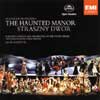Moniuszko (The) Haunted Manor
G&S meets Smetana in Polish, in a performance full of native fervour
View record and artist detailsRecord and Artist Details
Composer or Director: Stanislaw Moniuszko
Genre:
Opera
Label: EMI
Magazine Review Date: 7/2004
Media Format: CD or Download
Media Runtime: 141
Mastering:
Stereo
DDD
Catalogue Number: 557489-2

Tracks:
| Composition | Artist Credit |
|---|---|
| Straszny dwór (The Haunted Manor) |
Stanislaw Moniuszko, Composer
Adam Kruszewski, Miecznik, Baritone Agnieszka Zwierko, Marta, Soprano Anna Lubanska, Jadwiga, Mezzo soprano Dariusz Stachura, Stefan, Tenor Iwona Hossa, Hanna, Soprano Jacek Kaspszyk, Conductor Jacek Parol, Grzes, Tenor Krzysztof Szmyt, Damazy, Tenor Piotr Nowacki, Zbigniew, Bass Polish National Opera Chorus Polish National Opera Orchestra Romuald Tesarowicz, Skoluba, Bass Stanislaw Moniuszko, Composer Stefania Toczyska, Czesnikowa, Mezzo soprano Stefania Toczyska, Stara niewiasta, Soprano Zbigniew Macias, Maciej, Baritone |
Author: Edward Greenfield
Stanislaw Moniuszko (1819-72), the leading Polish romantic after Chopin, is generally remembered, if at all, by his opera, Halka, a tragic story in a peasant setting. Yet in almost every way The Haunted Manor, one of the hidden treasures of Polish opera, is more original, more inventive and above all more attractive with its tuneful sequence of ensembles. It is good that EMI has issued this set just when the same company and cast has performed it in their short season at Sadler’s Wells in London in April.
The two shuddering chords of the opening reflect the menacing title, but then the first scene sets quite a different tone of voice in a rousing military ensemble. Two soldier brothers, Stefan and Zbigniew, on leaving their comrades-in-arms, swear they will never marry, so as always to be ready to fight for their country. They find their match when they visit an old friend of their father, Miecznik, the Sword-Bearer, and meet his two daughters, Hanna and Jadwiga, each intent on finding a husband.
The manner is as close to Gilbert and Sullivan as to Smetana, with a dash of Donizetti thrown in. A fortune-telling scene prompts a charming duet and ensemble for women’s voices, when the sisters learn that they will marry soldiers. A central hunting scene anticipates the scene in Ruddigore where painted portraits come to life.
The plot rather rambles towards the end, but the denouement is helped by the arrival of a crowd of party guests, which, however implausibly, gives Moniuszko the excuse to insert a big mazurka number for the full ensemble, guaranteed to bring the house down.
Though ensembles predominate, each of the main characters is given a big showpiece aria. The one for Hanna is particularly impressive, with its Donizettian coloratura brilliantly sung by the bright-toned Iwona Hossa. Anna Luba´nska with her firm, warm mezzo, is also impressive as Jadwiga, but the the two brothers are not so strong. Dariusz Stachura, sounds strained as Stefan, often not attacking notes cleanly, and Piotr Nowacki as Zbigniew is happier in fast music than sustained melody, where his baritone grows unsteady.
Best of all is Adam Kruszewski in the central role of the host, Miecznik, the Sword-Bearer, a fine baritone with a timbre not unlike Sir Thomas Allen’s. Among the buffo characters is a formidable aunt figure, strongly taken by Stefania Toczyska. Jacek Kaspszyk’s dynamic conducting inspires superb playing and singing from the Polish National Opera forces. The tautness of the performance is enhanced by well-balanced sound, recorded on home ground in the Polish National Opera in Warsaw.
The two shuddering chords of the opening reflect the menacing title, but then the first scene sets quite a different tone of voice in a rousing military ensemble. Two soldier brothers, Stefan and Zbigniew, on leaving their comrades-in-arms, swear they will never marry, so as always to be ready to fight for their country. They find their match when they visit an old friend of their father, Miecznik, the Sword-Bearer, and meet his two daughters, Hanna and Jadwiga, each intent on finding a husband.
The manner is as close to Gilbert and Sullivan as to Smetana, with a dash of Donizetti thrown in. A fortune-telling scene prompts a charming duet and ensemble for women’s voices, when the sisters learn that they will marry soldiers. A central hunting scene anticipates the scene in Ruddigore where painted portraits come to life.
The plot rather rambles towards the end, but the denouement is helped by the arrival of a crowd of party guests, which, however implausibly, gives Moniuszko the excuse to insert a big mazurka number for the full ensemble, guaranteed to bring the house down.
Though ensembles predominate, each of the main characters is given a big showpiece aria. The one for Hanna is particularly impressive, with its Donizettian coloratura brilliantly sung by the bright-toned Iwona Hossa. Anna Luba´nska with her firm, warm mezzo, is also impressive as Jadwiga, but the the two brothers are not so strong. Dariusz Stachura, sounds strained as Stefan, often not attacking notes cleanly, and Piotr Nowacki as Zbigniew is happier in fast music than sustained melody, where his baritone grows unsteady.
Best of all is Adam Kruszewski in the central role of the host, Miecznik, the Sword-Bearer, a fine baritone with a timbre not unlike Sir Thomas Allen’s. Among the buffo characters is a formidable aunt figure, strongly taken by Stefania Toczyska. Jacek Kaspszyk’s dynamic conducting inspires superb playing and singing from the Polish National Opera forces. The tautness of the performance is enhanced by well-balanced sound, recorded on home ground in the Polish National Opera in Warsaw.
Discover the world's largest classical music catalogue with Presto Music.

Gramophone Digital Club
- Digital Edition
- Digital Archive
- Reviews Database
- Full website access
From £8.75 / month
Subscribe
Gramophone Full Club
- Print Edition
- Digital Edition
- Digital Archive
- Reviews Database
- Full website access
From £11.00 / month
Subscribe
If you are a library, university or other organisation that would be interested in an institutional subscription to Gramophone please click here for further information.




